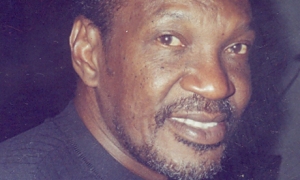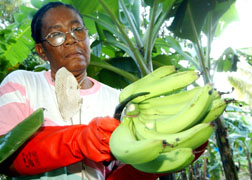
LONDON, United Kingdom – In his multi-island, eastern Caribbean nation of St. Vincent and the Grenadines (SVG), where the tropical climate bathes the fertile, volcanic soil in a daily average temperature of 27 degrees Celsius, the name Renwick Rose, is synonymous with farmers’ organisation.
But here, in this metropolis, where the population is 100 times larger that SVG’s and many often long for tropical respite from winter gales, it is not many who have heard of Rose.
But Rose is truly an unsung hero, very deserving of the 2011 Guardian International Development Achievement award, announced on Nov. 17.
The award is designed to recognise some of the unsung heroes of international development. It is reserved for people who have made “a profound contribution to the alleviation of poverty, working above and beyond the call of duty to make a difference to the lives of some of the world’s poorest people”.
And among this year’s nominees, the judges decided that no one embodied these qualities more than Rose.
In his winner’s article, Rose describes the award is “a validation” of his decades of work with and on behalf of “embattled farmers” in the Eastern Caribbean.
The community activist and social commentator notes that many of these farms are “tiny holdings based on family labour”.
“I have undying admiration for our farmers who have had to combat both man-made and natural disasters and to demonstrate their resilience year after year as well as their commitment to their just cause,” he writes.
“The International Development Achievement Award 2011 is therefore as much theirs as it is a vindication of my own humble contribution. At the same time, it must be used as a clarion call to awaken those who have since consigned the Caribbean to the footnotes of international development efforts.”
Rose pays special tribute to women farmers of the Windward Islands Farmers Association (WINFA), where he has been working for the past 22 years.
“Many of them are heads of single-parent households, whose lives represent living chapters in an unending story of the pursuit of life with equal opportunities, dignity and honour,” he observes.
“My own part in this noble effort has been to support, to help to give organisational form and leadership and to try and be a channel through which the long muffled voices of our farmers can at long last echo across the world in their clamour for justice,” he further states.
Rose was among five nominees shortlisted for this year’s award.
American Molly Melching was nominated for community-led education and sustainable development in Senegal.
In Nairobi, Kelvin Mwikya founded a foundation to address basic hygiene and nutrition needs of inmates and reintegrate ex-offenders into society.
Pakistani-American Sameena Nazir founded an organisation that provides creative training and skills development to girls without high school education.
And Mechai Viravaidya launched in Thailand an organisation that drew a firm line between poverty alleviation and reproductive rights.

And then there is Renwick Rose, who has worked for 40 years in civil society development and trade justice, but is not a globally recognised name, a point that his biographical sketch also notes.
But Rose is “a celebrated figurehead affectionately known as the ‘Banana Man’” among the small farming communities of the Windward Islands, the profile further says.
And in his native SVG, as far as his public service is concerned, Rose is known for at least two things: his frank and thoughtful columns in Searchlight newspaper, and his involvement with farmers.
Most recently, in his Oct. 4 column, he called the Unity Labour Party government’s attention to banana farmers picketing the Ministry of Agriculture for its inaction on the black sigatoka diease.
At the same time, Agriculture Minister Montgomery Daniel, in response to an alleged untoward comment by a protesting farmer, insulted black, East Indian and Portuguese Vincentians as he highlighted his indigenous heritage.
“The Minister has gone too far this time. Poor judgement and poor taste, can only be rewarded with poor marks. Over to you P.M.,” Rose wrote.
And months ago, on Aug. 30, Rose, in his column, spoke of Winfresh — marketers of Vincentian bananas in the United Kingdom — “relegating St. Vincent to the export of low-priced products and even a threat of total suspension of shipments altogether” because of the impact of black sigatoka on the quality of fruit sent here.
He also noted that WINFRESH had acted upon its long-standing threat to pursue quality claims against the trading arm of the Fairtrade organisation, WINFARM.
Black sigatoka, Rose said, was first spotted in St. Vincent in October 2009 but was only confirmed, officially, after “three months of hush-hush”.
He also listed a number of measure agreed upon by stakeholders and the Ministry of Agriculture at a meeting after confirmation of the disease.
Among the measures Rose mentioned was “that there should be an increase in the number and frequency of aerial spraying”.
“Please note this,” he added in parenthesis, at a time when the disease was allowed free reign across the country in the absence of aerial spraying.
“Were we successful in these noble endeavours?” he asked at the end of the list and his column. “We shall see next week,” he said in signing off.
That same week, the Dr. Ralph Gonsalves government in Kingstown announced EC$2.5 million in assistance to struggling banana farmers, days after spraying recommenced.
But Rose’s recent pronouncement on banana is but a small paragraph in the book that his efforts on behalf of farmers.
In the 1990s, as the banana trade entered a downwards spiral, Rose recognised the value and necessity of organisation and cooperation.
He guided farmers through the process of Fair Trade Certification as they were confronted with the challenges of getting their fruits onto the market
“When I first got involved with WINFA, … I began pushing that … we need to look beyond just producing and complaining about market and see how we can link up with other forces in the world and what we can do to try and influence the trends in world trade that were affecting us,” Rose recounts in a Guardian video.
And in his winner’s article, Rose, the son of a tailor and a pre-school teacher, says he and farmers have worked together since the 1970s, “fighting for the right to access to and ownership of the land.
“On this land, our farmers produce, feeding our people and providing valuable foreign exchange which has fuelled our still limited social and economic development,” he explains.

Rose further speaks of the successes in land reform as “the end of what was in reality modern estate serfdom”.
He says that the glory of the heyday of the banana industry, in the 80s and early 90s, masked some realities in production, trade and the environment, which were to be brutally exposed.
And when the Single European Market was instituted in 1993, it brought with it changes in the terms of access to the European market for Windward Island bananas.
These changes had “profound implications for not just the banana industry, but for agriculture, rural development and for the very economies of our islands,” Rose says.
Rose further states that many of these experiences have been “negative” and manifested themselves in the removal of preferential access to the European market, among other factors that had “disastrous consequences for our farmers in a vicious ‘race to the bottom’”.
“But, ever an optimist, I prefer to look at the positives which have emerged in the farming community and their impact on the wider society as a result,” Rose says.
“For me, the very fact that we could get farmers, most of whom only got a basic primary education, to engage the global giants in a battle right into the corridors of the European Commission, the hallowed halls of … the World Trade Organisation, … is a major achievement,” Rose says.
But not only is Rose “ever an optimist”, but he is also firmly grounded in reality.
“True, we have neither won the battles so far, nor been able to bring the ‘wars’ to a satisfactory end, but we have enriched our experience many times over in the process,” he says.
Rose was preparing to retire in 2010 but shelves those plans when Hurricane Tomas all but wiped out banana cultivation in St. Vincent and St Lucia at the end of October.
“He returned immediately to lead the farming community on the uphill slope towards recovery, and, with his support, Windward Island bananas were back on the supermarket shelves within eight months,” the biographical sketch says.
And Barbara Crowthre, Fair Trade director of communication and policy, in a Guardian video about the 2011 Guardian International Development Achievement award winner says:
“We do see [Fair Trade] as a social movement that is trying to bring farmers and shoppers closer together in mutual understanding and mutual support. I think nobody sort of embodies that more than Renwick.”
The judges for the Guardian International Development Achievement award2011 agree.
Follow our Feed, Follow on Facebook, Follow on Twitter





